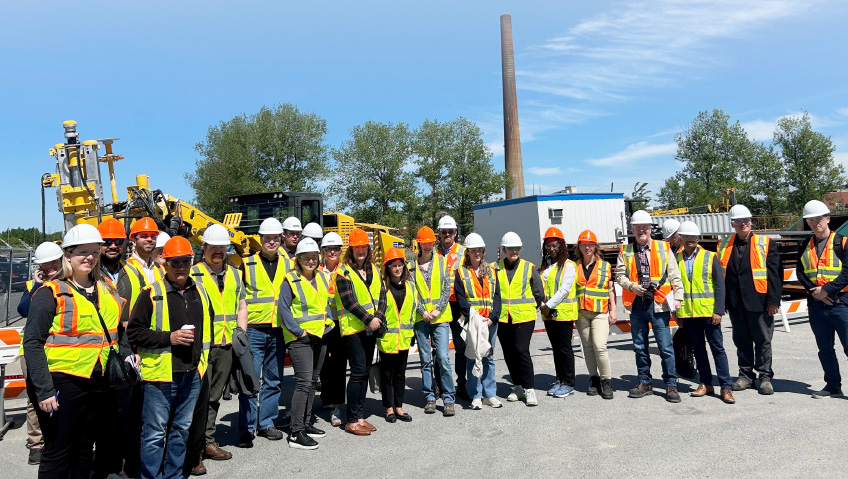Corryn Clemence, CEO of the Tourism Industry Association of PEI (TIAPEI), arrived in Prince Edward Island, Canada’s smallest province, for a two-week visit in 1997, the year the Confederation Bridge opened. She was so enchanted by the island that her two-week stay extended to two months.
She did return to Calgary to work, “but I moved back for good in 2000, because I’d fallen in love with PEI,” she says. “And I still see it from a visitor’s perspective. When people grow up here, they may take it for granted, but it’s a unique and special place. That’s what makes my job—supporting our tourism industry and operators—such fun.”
With over 1,100 km of shoreline, 90 sandy beaches, rolling countryside, all the lobster, mussels, oysters, and potatoes you can eat, 32 golf courses, a national arts centre, a port where cruise ships dock, an interesting mix of cultures, and oodles of charm, one might think that the tourism industry on Prince Edward Island would barely have to lift a finger to keep visitors coming back.
But one would be so wrong! We learned from Clemence of the concerted effort it takes to ensure that this vital industry (employing one in eight islanders, and in 2019 generating $82 million in provincial tax revenue), already the second largest economic driver, stays healthy and keeps growing. We also learned that this growth is only made possible through the individual efforts of all tourism stakeholders, strongly supported by services and initiatives from TIAPEI.
Today, the association has 482 members across the island from all sectors, including accommodation, restaurants, retail, attractions, festivals, and events. “We have a great variety of members with varying needs that we represent,” Clemence says.
Among the many benefits members enjoy are group insurance benefits for operators and staff, with rates for single, family, and waived coverage; exclusive discounts on services ranging from graphic design, printing, and photocopying to home heating oil, and web hosting services; and a rebate from Chase Merchant Services.
In addition to these benefits, Clemence is delighted to be able to share news about some exciting new initiatives of great benefit to operators.
PEI’s tourism operators have always practiced a high level of sanitation, but Clemence says that because of the pandemic, the industry realized that more needed to be done to reassure visitors that the island was truly a safe place to bring their families. As a result, TIAPEI and Tourism PEI partnered with EarthCheck, an Australian-based world leader in scientific benchmarking and certification and an advisory group for travel and tourism, to develop their own Safe Haven program. This initiative establishes and upholds even higher standards of health and safety management, and is offered as a voluntary program, free of charge, to members.
The Safe Haven program is flexible, in that it is applicable to all types of tourism operation—fixed roof accommodation, campgrounds, restaurants, golf courses, retail, PEI Authentic Experiences, festivals, attractions, museums, and theatres—and goes above and beyond current legislation such as the Tourism Industry Act and the Public Health Act.
The program involves an online self-assessment for operators and helps them develop standard operating procedures for various health and hygiene categories; helps operators ensure staff members have access to materials to meet the standards, such as disinfectant, masks, and hand sanitizer; provides a training program for their use; and conducts an external audit.
“What’s different about this program is that we have added in that extra layer, where we have an auditor go out and audit the property to ensure that everything the operators say they are doing, they are actually putting into practice,” Clemence explains.
In return for achieving Safe Haven certification, businesses can display in their premises the program’s “seal of approval” as well as promotional material “confirming that the location that bears it is a worry-free destination, giving visitors the assurance that they want,” she says.
Safe Haven has been so successful that it caught the attention of Skift, a leading international travel news outlet, which awarded Prince Edward Island the 2022 Skift IDEA Award for Pandemic Response.
“Another program that is near and dear to my heart is the Tourism Wellness Program,” Clemence shares. “The industry has faced some incredibly difficult years with pandemic challenges, labour shortages, and the devastation of Hurricane Fiona. We know that everyone needs support at one time or another, and during this period there was a lot of added pressure and stress not only on our operators but on their staff and families.”
This wellness initiative is offered by TIAPEI with support from the provincial government. It provides up to six sessions per year of free, professional, confidential counselling for operators, employees, and their families through the Atlantic Employee Assistance Program, with three counsellors available in-person or online. Available supports include individual and family counselling, alcohol and drug treatment, stress and anxiety support, bereavement support, couples and marital support, and resources for dealing with depression, parenting, legal or financial matters, and learning disabilities.
Early in 2023, TIAPEI hosted a town hall-style meeting so that local operators could meet and speak with the executives from three national bodies—the Tourism Industry Association of Canada, with which TIAPEI is affiliated; Destination Canada; and the Indigenous Tourism Association of Canada.
“It helps us to have our finger on the pulse of what’s happening nationally,” Clemence says, “and vice versa, so that these national organizations have an opportunity to learn what our challenges and our successes are. The biggest challenge across the country is the labour workforce, and that’s the one we are working on now. We do high school presentations about careers in tourism and culinary, we host job fairs to showcase the available positions, and we have a public perception campaign where we talk about what’s so great about the industry,” she explains.
“We have done two international recruitment missions and we have a full workforce action plan that addresses housing, childcare, and transportation. We are trying to attack it from every angle but there is no single, magic bullet that will fix it immediately.”
A lot of conversation took place around international recruitment and housing solutions for seasonal workers, permanent residents, or people on working holiday visas, and how the industry can better accommodate individuals coming to Canada to work.
“It was worthwhile to hear because we can take what we learned from operators in other parts of the country and try to implement it here,” says Clemence, referring to the three-year New Tourism Workforce Action Plan which TIAPEI instituted in June 2022, which highlights the need for continued support of operator capacity.
Clemence and the TIAPEI staff, in partnership with the federal and provincial governments, have worked with industry to develop an array of free training programs and workshops that offer operators opportunities to enhance their skills and acquire new techniques for developing their businesses. Among these was a mixology workshop with Lesley Quinn, Atlantic Canada’s Top Sommelier; workshops on how to use social media and Instagram strategies to take business to the next level; and Commercial Insurance 101, from the experts at the Insurance Bureau of Canada.
In addition to workshops developed for owner/operators are several programs aimed at enhancing the workforce. One example is a 12-week kitchen training and internship Entry Level Cook Training program, in which participants can earn a stipend equivalent to the minimum wage for over 30 hours a week, funded through the Canada-PEI Labour Market Agreements.
PEI BEST Service Excellence offers a one-day workshop with five modules which teach employees the skills to handle customer complaints, and there are opportunities to access Canada’s best online tourism and hospitality training through emerit. These are national skills training products developed by Tourism HR Canada and distributed by TIAPEI.
Through emerit learners can study over 24 occupations online at times convenient for them, including Event Coordinator, Front Desk Agent, Sales Manager, Director of Housekeeping, Heritage Guide, and Travel Manager. Employees certified through emerit earn a national credential that identifies them as professionals.
So yes, there were pandemic shutdowns, inflation, workforce shortages, and a hurricane to contend with, but Clemence says, “There was a silver lining in all this. It has strengthened communication and collaboration within the industry. We had a strong return in 2022 and we are hoping for the same in 2023 when the numbers are in,” she shares.
“It is great to see the passion of our operators as they innovate and adapt their offerings, adjust, and move forward because we are all partners in this. We want to make sure the public understands the value of tourism because it’s a celebration of where we live, our neighbours, our history, our authenticity, and our farmers and fishers. I think it’s important that we continue to tell this story.”






